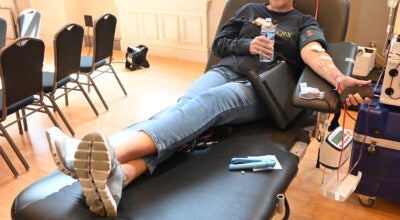Published 12:00 am Saturday, May 12, 2012
By Karissa Minn
kminn@salisburypost.com
SALISBURY — A local political analyst says that while he wasn’t surprised that Amendment One passed, figuring out who voted for it and why is more complicated than it seems.
Michael Bitzer, political science professor at Catawba College, said no exit polls from Tuesday’s election show how voters made their choice. But the political and religious makeup of North Carolina and Rowan County could help explain it.
The constitutional amendment, which prevents the state from recognizing gay marriage and civil unions, passed 61 percent to 39 percent statewide and 74 percent to 26 percent in Rowan.
Out of the county’s 41 precincts, only four had majorities who voted against it.
“It was to be expected that the amendment would pass — and that in rural counties across North Carolina such as Rowan County, that it would pass overwhelmingly,” Bitzer said. “But I was surprised by some pockets here, primarily in the city of Salisbury and also East Spencer, that actually voted against the amendment.”
Majorities in West Ward 3, West Ward 1, North Ward and East Spencer all voted “no” on the amendment.
These precincts are some of the most urban in the county — and some of the most heavily Afric-an-American.
Bitzer said more African-American voters identify as “evangelical” Christians — the religious group most likely to oppose gay marriage when surveyed — than white voters nationwide.
Amendment supporters of any race usually gave religious reasons for their vote to Post reporters. But some opponents said their faith guided them to vote against it.
The Rev. William Barber, pastor and president of the North Carolina chapter of the NAACP, has spoken strongly against the amendment. He framed it as a civil rights issue, not a religious one, noting that same-sex marriage is already illegal in North Carolina.
“There was kind of a split within black churches and with civil rights leaders over this issue,” Bitzer said. “I heard a lot of black churches and ministers come out for the amendment.”
The four Rowan precincts that opposed the amendment also tend to vote Democratic, Bitzer said, along with those that were more evenly split — West Ward 2, East Ward, South Ward and West Innes in Salisbury and the Spencer precinct.
In contrast, he said, the precincts that voted most solidly for the amendment cast many more Republican ballots than Democratic ones.
Those include Bostian Crossroad, Bostian School and East Enochville, where even the Democrats cast more votes for “No Preference” than for President Barack Obama.
The county’s more rural areas tended to vote more strongly in favor of the amendment.
The seven North Carolina counties that voted against the amendment tend to be more urban, and they are all home to universities.
Bitzer said this could reflect the “generation gap” in attitudes toward gay marriage. Polls show that people under 30 — like college students — are more likely to be in favor of it than those over 50 years old, he said.
“In the early votes cast before Tuesday, the average age of voters was 57 statewide,” Bitzer said.
Confusion also may have impacted the vote, because some people at the polls said they didn’t know what a “for” or “against” vote would mean.
In general, supporters of the amendment seem to have been much more motivated to vote than its opponents, Bitzer said. That could explain why it passed by a higher margin than many surveys predicted.
Voter turnout was higher in counties that voted strongly for the amendment than in those that voted against it.
“This is an issue that is polarizing on both sides,” he said. “But when it comes to voting on the issue, the energy is typically on banning gay marriage — or re-affirming it as one man and one woman.”
nnn
Controversy over Amendment One hasn’t ended with the vote.
At one point Tuesday, both “Amendment One” and “North Carolina” were trending topics worldwide on Twitter. In the hours and days after the measure passed, many people took to social media to express relief, joy, anger and disappointment.
Salisbury resident Tori Moore said she invited amendment supporters to “unfriend” her on Facebook, because they voted to control her life the way she would never choose to control theirs.
“I simply put on there that I love and respect all my Facebook friends, but if you voted yesterday for Amendment One … I request that you would unfriend me,” Moore said. “You know, if you have friends who don’t love you for who you are, they’re not really your friend.”
She said she and her partner, Ashley, have been together for 13 years, and they probably would get married if North Carolina allowed it.
Moore said she doesn’t think she lost any real friends because of her Facebook post, though some who don’t know her well may have left.
“I had like 18 comments that said, ‘You’re stuck with me,’ ” she said. “I didn’t get any bad comments. I don’t know if I have less friends.”
David Pruett, of Granite Quarry, said someone did unfriend him on Facebook after he posted a status against the amendment.
“I said I was not happy with the decision, because I had read about how certain people would be losing their rights,” Pruett said.
This prompted comments from family and friends, who disagreed with Pruett and each other about the amendment’s effects.
One of his friends — “I’ve known her for quite a while” — deleted her comments and removed Pruett as a contact.
“To defriend somebody because of a decision like that is not (being) much of a friend,” he said. “A friend is going to respect a decision you made, whether they like it or not.”
Contact reporter Karissa Minn at 704-797-4222.
Twitter: twitter.com/postcopolitics
Facebook: facebook.com/ Karissa.SalisburyPost


